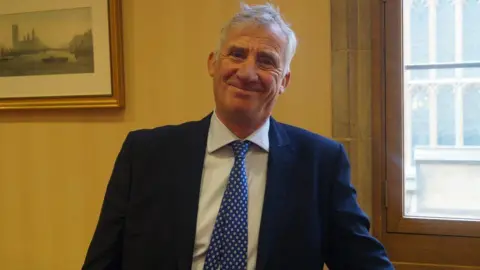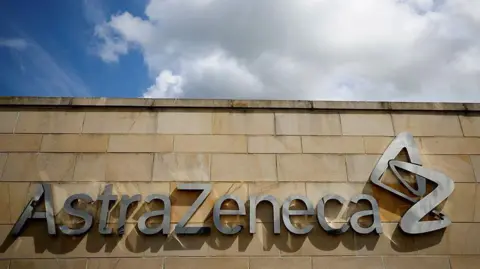Peer demands answers on AstraZeneca deal collapse
 Lord Storey
Lord StoreyA Liberal Democrat peer has accused the government of favouring the south-east of England over Merseyside after AstraZeneca pulled out of a £450m investment.
The pharmaceutical giant had signed a deal with the previous Conservative administration for a major expansion of its vaccine manufacturing plant in Speke, Liverpool.
However, the firm said it was pulling out after the Treasury reduced the amount of government funding it was willing to provide to support the plans.
Mike Storey CBE, who previously served as leader of Liverpool City Council, told BBC Radio Merseyside it was "absolutely shocking" that the deal had collapsed at the same time "billions" were being spent on the life sciences sector in the South East.
Lord Storey said: "It is bizarre, is it not, that a former Conservative government gave us the money, signed the deal with AstraZeneca, and it's a Labour Government which is taking it away from us.
"I just can't believe it, so I very much hope that something else is going to be available for Merseyside, it's very important."
The BBC has contacted the government for a response.
It previously defended its negotiations with AstraZeneca, blaming a shortfall in government funding.
Science minister Sir Chris Bryant told Parliament that the government had made a "significant offer" of support to the firm, but doing more "simply didn't add up for the taxpayer".
 Reuters
ReutersThe plan to expand the site, which manufactures the flu vaccine, was announced by then-chancellor Jeremy Hunt in the 2024 spring budget.
A government spokesperson said a change to the "make-up of the investment" that had originally been proposed led to the government grant being reduced.
Pascal Soriot, chief executive of AstraZeneca, said there was no rift with the government but the deal was no longer "economically viable" without the same level of funding as agreed previously.
"It wasn't possible for the government to justify it, which we totally understand, and we said we couldn't justify it either," he said.
"We were all very disappointed, but that's business life."
Lord Storey said he feared the government was not "putting Liverpool and Merseyside high on its growth agenda".
"Any money that's spent by government has to be carefully considered but my point is if they've got billions of pounds for growth, mainly in the South East, are they looking closely at the money there?" he said.
"No they're not - they're just saying they're going to provide that money and infrastructure - Liverpool yet again seems to miss out."
In the House of Lords on Thursday morning Lord Storey posed an urgent question to Lord Vallance, minister of state for science, research and innovation.
He asked whether Liverpool City Region's Metro Mayor, Steve Rotheram, was "aware" of discussions over AstraZeneca and how the government planned to develop the city's life-sciences sector.
Lord Vallance said Mr Rotheram was aware and highlighted that AstraZeneca would still be producing vaccines at its Speke site.
"I recently have been speaking to metro mayors about how we can make sure that [research and development] funding is supportive of what metro mayors are trying to achieve," he said.
Listen to the best of BBC Radio Merseyside on BBC Sounds and follow BBC Merseyside on Facebook, X, and Instagram, and watch BBC North West Tonight on BBC iPlayer.
